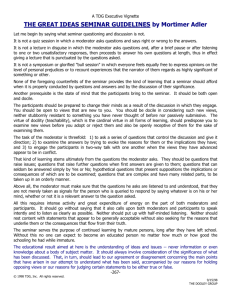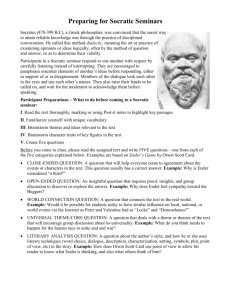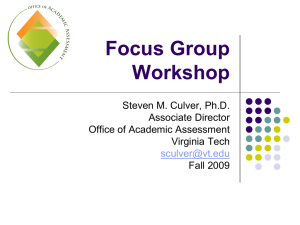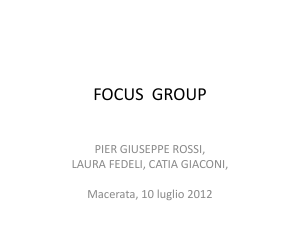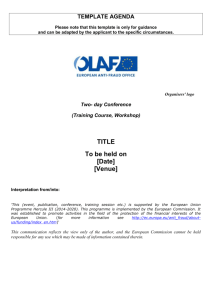Preparing for Socratic Seminars - Miles-o
advertisement
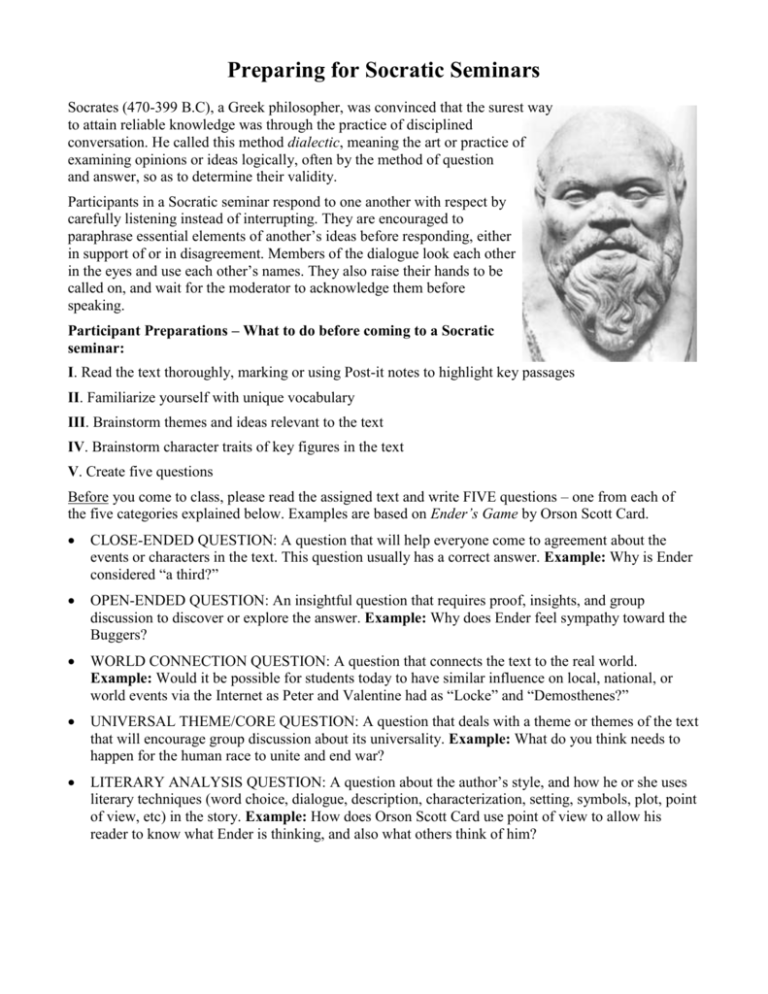
Preparing for Socratic Seminars Socrates (470-399 B.C), a Greek philosopher, was convinced that the surest way to attain reliable knowledge was through the practice of disciplined conversation. He called this method dialectic, meaning the art or practice of examining opinions or ideas logically, often by the method of question and answer, so as to determine their validity. Participants in a Socratic seminar respond to one another with respect by carefully listening instead of interrupting. They are encouraged to paraphrase essential elements of another’s ideas before responding, either in support of or in disagreement. Members of the dialogue look each other in the eyes and use each other’s names. They also raise their hands to be called on, and wait for the moderator to acknowledge them before speaking. Participant Preparations – What to do before coming to a Socratic seminar: I. Read the text thoroughly, marking or using Post-it notes to highlight key passages II. Familiarize yourself with unique vocabulary III. Brainstorm themes and ideas relevant to the text IV. Brainstorm character traits of key figures in the text V. Create five questions Before you come to class, please read the assigned text and write FIVE questions – one from each of the five categories explained below. Examples are based on Ender’s Game by Orson Scott Card. CLOSE-ENDED QUESTION: A question that will help everyone come to agreement about the events or characters in the text. This question usually has a correct answer. Example: Why is Ender considered “a third?” OPEN-ENDED QUESTION: An insightful question that requires proof, insights, and group discussion to discover or explore the answer. Example: Why does Ender feel sympathy toward the Buggers? WORLD CONNECTION QUESTION: A question that connects the text to the real world. Example: Would it be possible for students today to have similar influence on local, national, or world events via the Internet as Peter and Valentine had as “Locke” and “Demosthenes?” UNIVERSAL THEME/CORE QUESTION: A question that deals with a theme or themes of the text that will encourage group discussion about its universality. Example: What do you think needs to happen for the human race to unite and end war? LITERARY ANALYSIS QUESTION: A question about the author’s style, and how he or she uses literary techniques (word choice, dialogue, description, characterization, setting, symbols, plot, point of view, etc) in the story. Example: How does Orson Scott Card use point of view to allow his reader to know what Ender is thinking, and also what others think of him? How I conduct the Socratic seminar 1) Students bring five seminar questions to class. They show them to me and receive a Socratic seminar “pass” – a small picture of Socrates that serves as their admission ticket. 2) A student moderator is selected. The moderator will call on those who raise their hands to ask questions or respond to others’ comments. The moderator is tasked with keeping order and ensuring that only those who raise their hand to speak, speak. The moderator also encourages students to further the discussion and build on others’ responses. The moderator encourages students to paraphrase others’ ideas. When no students raise their hands to further discussion on a particular topic, the moderator then says, “OK, who has a new question?” 3) As teacher, I sit at the back and do not speak or react to students’ comments (as best I can). The idea is that this is their space, their forum, their expression. Sometimes I’ll prompt the moderator to call on a student if the moderator misses a volunteer, or I’ll encourage the moderator to prompt students to further develop or explore an idea, but overall, I do my best not to say anything. 4) In my gradebook I create three columns. One for “asked initial question,” another for “provided an initial response,” and a third for “secondary or tertiary response.” These are the three grading categories I use. My goal is for all students to earn a “check,” which means they asked two questions, were the first to respond to two questions, and built on two other students’ responses.
